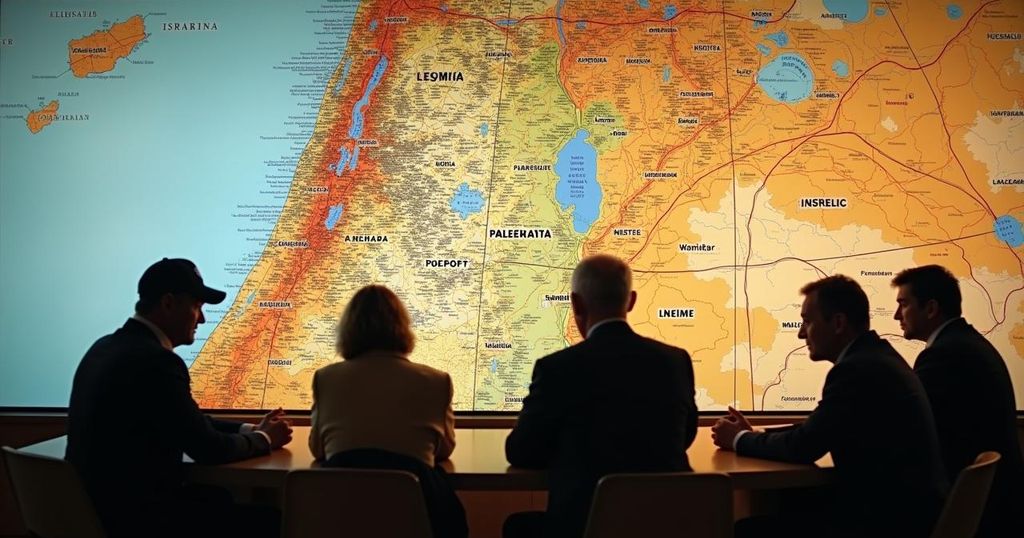Netanyahu’s UN Address: A Geopolitical Narrative Excluding Palestine

During his address at the UN, Israeli Prime Minister Benjamin Netanyahu showcased two maps, “The Curse” and “The Blessing,” to illustrate perceived threats and alliances in the Middle East. Both maps notably excluded Palestine, with Netanyahu attributing regional conflicts to Iranian influence and asserting Israel’s military actions as defenses against such threats. The address also touched on Israel’s evolving relationships with Saudi Arabia, Egypt, Sudan, and India amidst the backdrop of ongoing tensions.
Israeli Prime Minister Benjamin Netanyahu recently addressed the United Nations General Assembly, presenting two maps to illustrate his perspective on the Middle East. The first map, deemed “The Curse”, showcased countries such as Iran, Iraq, Syria, and Yemen in black, while the second map, labeled “The Blessing”, highlighted nations including Egypt, Sudan, Saudi Arabia, and India in green. Notably, both maps entirely omitted any mention of Palestine, suggesting a denial of its existence in the regional discourse. In his address, Netanyahu attributed the ongoing violence in the region, particularly in Lebanon, Syria, and Yemen, to the influence of Iran and its allies, accusing them of exacerbating the conflicts through financial and military support to groups like Hezbollah and Hamas. He asserted Israel’s military actions as necessary defenses against threats posed by Iranian-backed forces, emphasizing that “as long as Hezbollah chooses the path of war, Israel has no choice but to remove this threat”. Among the countries depicted in Netanyahu’s “green” map, Saudi Arabia’s inclusion is significant, particularly in the context of ongoing negotiations for normalization of relations between Israel and Saudi Arabia. Despite hopes for a transformative diplomatic arrangement, Saudi Arabia has reiterated that recognition of Israel hinges on the establishment of a Palestinian state. Egypt’s presence on the map is understandable, given its long-standing peace treaty with Israel established in 1979, even though the relationship has often been characterized by tension. Egypt has actively engaged in regional stability efforts, particularly concerning Gaza, while Sudan’s normalization of relations with Israel marked a notable shift from its previous antagonistic stance. India’s representation in the “green” zone reflects its growing ties with Israel, particularly in defense and technology, under the leadership of Prime Minister Narendra Modi, despite its historical support for Palestinian self-determination. Ultimately, Netanyahu’s maps and proclamations at the UN signal an ongoing geopolitical narrative in which Israel seeks to position itself against perceived threats, notably from Iran, while navigating complex regional alliances and the contentious issue of Palestine’s recognition.
The recent address by Israeli Prime Minister Benjamin Netanyahu at the United Nations General Assembly highlights critical geopolitical tensions in the Middle East. Through the presentation of two maps, Netanyahu aimed to delineate the perceived threats posed by Iran and its allies, whom he identified as the destabilizing factors in the region. The omission of Palestine from these maps is particularly noteworthy, reflecting a broader narrative that discounts Palestinian statehood in the context of regional alliances. The relationships between Israel, Saudi Arabia, Egypt, Sudan, and India were also underscored as part of ongoing efforts for diplomatic normalization amidst the backdrop of longstanding conflicts involving Iranian influence.
In summary, Netanyahu’s address at the UN underscores Israel’s strategic narrative framing Iran and its allies as primary sources of regional instability. The maps he presented serve to highlight Israel’s alliances with countries like Saudi Arabia, Egypt, and Sudan, while conspicuously omitting any reference to Palestine. This omission reflects a complicated geopolitical landscape where normalization of relations and issues of statehood remain contentious and unresolved. Netanyahu’s remarks not only emphasize Israel’s military posture against Iranian threats but also indicate the complex interplay of regional politics that influences the quest for peace in the Middle East.
Original Source: www.ndtv.com








